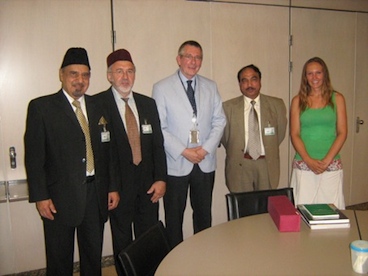Human rights policy and the European Parliament
Human rights policy and the European Parliament
This week I welcomed a delegation from the Ahmadis. The Ahmadis regard themselves as Muslims, but follow their own interpretation of Islam. For this, reason in many Muslim countries, in particular Pakistan, they are discriminated against and persecuted. I always find such meetings impressive, but at the same time must explain that in relation to foreign policy the Dutch national parliament has much more power than does the European Parliament. Certainly, in the EP a large number of resolutions are adopted, but their value is purely symbolic. Only where treaties with third countries are concerned does the EP have any real say in matters.

Ahmadi delegation welcomed by Dennis and Jong en Femke Reudler Talsma
I am asked frequently in the European Parliament to receive or address groups from religious and ethnic minorities who are experiencing difficulties elsewhere in the world. I have had contact with representatives of the Palestinians, the Kurds, the Aleviets, the Iranian resistance, and last week from the Ahmadis. This time it didn't take place in Brussels but in the Dutch national parliament building in The Hague, where staff member Femke Reudler and I were for our monthly meeting with Harry van Bommel, the SP's national parliamentary spokesman on European affairs.
The Ahmadis are one of those groups who do not, indeed, have things easy. For many years there has existed in Pakistan a law which makes any kind of insult to Islam a punishable offence. Because of their divergent interpretation of Islam, almost every form of expression of the Ahmadhiyya religion is seen as insulting to Islam and results in immediate sanctions. In almost the whole of the Islamic world Ahmadis suffer discrimination. This goes even for moderate countries such as Indonesia. And this despite the fact that religion should surely be a matter for each and every individual: what on earth has the state to do with the question of which beliefs a person holds?
But however important it may be in itself to protect the rights of such minorities, the question is whether the European Parliament can do anything about this. And the answer is – very little. You can, together with other Euro-MPs, try on an informal level to exert an influence on the decisions taken by Ministers of Foreign Affairs. Now and then I make use of this possibility, but if the Council of Ministers is not open to such influence there is very little in the way of pressure that you can bring to bear. The resolutions passed by the EP during every Strasbourg plenary session are almost never even read by the Ministers of Foreign Affairs. That leaves only the right of the EP to consent or withhold consent to treaties with third countries, as well as to propose amendments to these. In such cases we may well be able to exert a real influence.
Fortunately human rights organisations and representatives of minority groups understand these limited competences. I tell them time and time again that it's best to take such matters to the national parliamentary group. Harry van Bommel can call our foreign minister to task and in the end it is this minister who will participate, including in Brussels, in the most important negotiations. At the same time I make it clear that the SP is, of course, in solidarity with all the world's oppressed peoples, which means that, if there is something truly I can do, such as during voting on treaties, I won't pass it up.
- See also:
- Dennis de Jong
